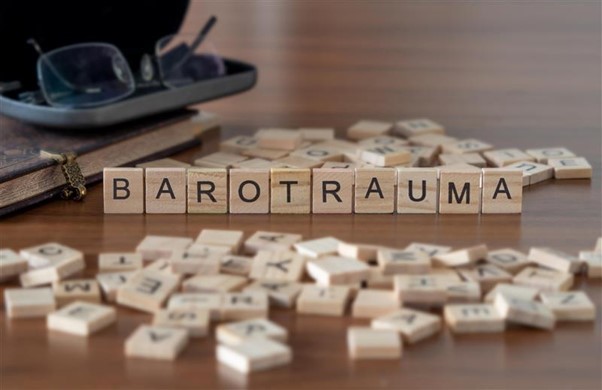What is Barotrauma?
Barotrauma is an injury caused by changes in air or water pressure. It often affects the ears, sinuses, or lungs. For example, ear barotrauma can happen during air travel or scuba diving. Sinus barotrauma may occur when pressure changes quickly. Many people experience mild barotrauma, but sometimes it can be serious. Because barotrauma symptoms can be confusing, it is important to know what to look for. Early barotrauma treatment can help prevent long-term problems. This guide explains barotrauma, its causes, symptoms, diagnosis, and how to prevent it.
Common Causes of Barotrauma
Barotrauma happens when your body cannot adjust to sudden pressure changes. These changes can occur in many situations. For instance, you may feel it during:Flying in an airplane (especially during takeoff or landing)Scuba diving or snorkelingDriving up or down mountainsUsing hyperbaric oxygen chambersBlowing your nose too hard
Sometimes, having a cold or allergies can make barotrauma more likely. This is because blocked airways make it harder for your body to balance pressure. Children are also at higher risk, as their ear tubes are smaller and can get blocked easily.
Recognizing Symptoms of Barotrauma
Barotrauma symptoms can vary based on the part of the body affected. However, some common signs include:Ear pain or discomfortFeeling of fullness or pressure in the ear or sinusesHearing loss or muffled soundsDizziness or balance problemsRinging in the ears (tinnitus)Sinus pain or headacheIn severe cases, nosebleeds or fluid leaking from the ear
Most cases are mild and go away on their own. But sometimes, symptoms can last or get worse. If you notice severe pain, hearing loss, or bleeding, you should seek medical help.
How Barotrauma is Diagnosed
Doctors use several methods to diagnose barotrauma. First, they will ask about your symptoms and recent activities. For example, they may ask if you have traveled by plane or gone diving. Next, they will examine your ears, nose, and throat. Sometimes, they use a special tool called an otoscope to look inside your ear. In some cases, hearing tests or imaging scans may be needed. These tests help rule out other causes and check for damage. Early diagnosis can help guide the right barotrauma treatment.
Treatment Options for Barotrauma
Treatment for barotrauma depends on how severe it is. For mild cases, home care may be enough. For example, you can try:Yawning or swallowing to open the ear tubesChewing gum or sucking on candy during flightsUsing nasal decongestant sprays (as advised by a doctor)Applying a warm cloth to the affected area
However, if symptoms are severe or do not improve, a doctor may prescribe medications. These can include pain relievers, antibiotics (if infection is present), or steroids to reduce swelling. In rare cases, surgery may be needed to repair damage or drain trapped fluid. Always follow your doctor’s advice for barotrauma treatment.
Prevention Tips for Barotrauma
There are several ways to lower your risk of barotrauma. You can try these tips:Swallow, yawn, or chew gum during pressure changesUse special earplugs made for flying or divingAvoid flying or diving with a cold or sinus infectionTake allergy or decongestant medicines before travel (if approved by your doctor)Descend and ascend slowly when diving
By following these steps, you can help protect your ears and sinuses from injury. Prevention is always better than treatment.
When to See a Doctor
Most mild cases of barotrauma get better on their own. However, you should see a doctor if you have:Severe or lasting ear painHearing loss that does not improveFluid or blood coming from your ear or noseSevere dizziness or balance problemsSymptoms that get worse over time
Early treatment can prevent serious problems. In many cities, ENT specialists are available to help with barotrauma symptoms and treatment.
Conclusion
Barotrauma can be uncomfortable, but most cases are mild and easy to treat. Still, knowing the causes, symptoms, and prevention tips can help you stay safe. If you think you have barotrauma, consult an ENT specialist for personalized advice.

